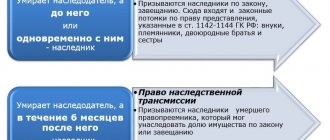3 ways to get a free consultation with a lawyer 01
Consultation with a lawyer on inheritance for free, click
Ask a question to a lawyer 02
Call toll-free line 8 (Moscow and regions of the Russian Federation)
03
in online chat, response in 10 minutes
Find out prices for inheritance lawyer services
How to deprive a first-rank heir of an inheritance according to the law is regulated by codified acts of the Russian Federation. The procedure for receiving an inheritance for most heirs is an event that can significantly improve their financial situation. However, the person who inherits by law or by will is not always guaranteed to receive the desired enrichment.
Deprivation of the right to inherit by will
The right of inheritance is guaranteed by the Constitution to every person included in the circle of heirs by law or specified in the will. The latter has priority over the legal regime: the testator can leave his property to any citizen, including non-relatives, or to an organization.
In addition, he can deprive the right to inherit from anyone: wife, children, parents, without explaining the reasons and without indicating any basis. Moreover, the entire content of the testamentary document sometimes comes down to only listing the persons who are excluded from receiving the inheritance.
To deprive one of the relatives of the right to his property, the testator uses one of two possible methods.
- The document directly indicates the person who does not have the right of inheritance. For example: “I am depriving my daughter of I.V.K. inheritance." In this case, she will not be able to receive property for any reason (except for the obligatory share if she is disabled).
- The will simply does not mention any relatives. The document may indicate property in general terms: “all property belonging to me at the time of death.” Thus, the testator “indirectly” disinherits individuals. But if specific things are listed (apartment, car, plot), and the testator also has other property not mentioned in the will, such persons retain the right to inherit by law.
Is it possible to disinherit?
Expert opinion
Dmitry Nosikov
Lawyer. Specialization: family and housing law.
Question: I am seriously ill, I want to dispose of all my property in a timely manner, including my apartment and car. I have a wife and two children - I want everything to go to them after my death. I also have a father. I know that he will also lay claim to part of the property. I don’t want him to get even a ruble - he once deprived me of everything. Is it possible to disinherit him?
Lawyer's response:
Of course, you have the right to dispose of your property as you wish - you can bequeath it to whomever you wish. And you can deprive those who are not worthy of owning your property of such a right. To do this, you need to make a will.
There is another way to deprive an inheritance - to declare the heir unworthy through the court, if there are good reasons for this.
How to deprive the rights of compulsory heirs?
The heirs entitled to an obligatory share of the inheritance include:
- disabled parents, spouses, for example, who have reached the established retirement age (according to the law, a pension is paid in connection with loss of ability to work);
- disabled children (those with disabilities, under the age of majority, studying full-time after 18 years);
- disabled dependents of 2–4 stages, at least a year before the death of the testator, who were supported by him;
- disabled citizens, regardless of relationship, who were dependent on the deceased and lived with him for at least 1 year before his death.
The persons listed above have the right to receive the obligatory share, regardless of the contents of the will. This is ½ of what they could legally inherit. It is practically impossible to disinherit them. However, the court may, taking into account the property status of the obligatory heir, reduce his share or completely refuse to award it.
To do this, the heirs under the will must file a claim and prove that the allocation of a compulsory share will entail the impossibility of receiving things that they used during the life of the testator, but the compulsory heir will not. The second reason is that objects were used as the main source of income (tools, transport, etc.).
Removal from inheritance by law
If during his lifetime the testator has the right to leave any orders regarding his property, then after death he is no longer able to protect his property. Therefore, current legislation provides for a number of cases when heirs may be deprived of the right to inherit by law. It is obvious that such court cases are initiated by persons interested in receiving an inheritance. Article 1117 of the Civil Code of the Russian Federation considers three such situations:
- the mother or father loses their rights if they were once deprived of parental rights by a court decision;
- children do not have the right to inherit from a parent if they have maliciously evaded the obligation to support them;
- Relatives who have committed illegal actions against the testator or other heirs that contributed to receiving an inheritance or increasing their share are considered unworthy and are deprived of the opportunity to receive the property of the deceased.
Of the three listed cases, perhaps only the first practically does not require proof. If a notary receives information about the fact of deprivation of parental rights, he, on the basis of the law, excludes the person from the circle of heirs. In other situations, the court makes a decision on the claim of the interested party.
Procedure
Watch the video about depriving an heir of the right of inheritance
The statement of claim must be accompanied by a package of documents, which includes:
- receipt of payment of state duty (300 rubles);
- death certificate of the testator;
- papers that confirm inheritance rights;
- documents proving the existence of the disputed property;
- documentary evidence of the heir’s unworthy behavior.
According to Part 3 of the Civil Code of the Russian Federation, inheritance is carried out in favor of persons specified in the will or designated as heirs by law.
But the procedure for exercising this right may be changed in the course of depriving one or more successors of the opportunity to accept the property of the deceased. The basis for such a measure may be their unworthy behavior or the testator’s orders in this regard.
In what situations this is possible and how it is done is described below.
For what actions can the right of inheritance be deprived?
Despite all respect for the will of the testator, the law does not allow violating the basic legal principle: no one has the right to obtain property by criminal means. Thus, if it is bequeathed to a person who, through his actions, hastened the death of the testator or caused it, such an heir will be deprived of the right of inheritance by law.
Since the law uses the term “actions” (and not “deeds”), an heir can be recognized as unworthy not only by a verdict of a criminal court, but also by a decision of a civil court, where the illegality of his act is proven. For example, fraud, forgery of a will, signatures, concealment of a document, destruction, forcing the testator to write a will in his favor.
The motive underlying the unlawful act does not matter (clause 19 of the Resolution of the Plenum of the Supreme Court No. 9 of May 29, 2012). The main thing: its deliberate nature, be the reason for the action: jealousy, revenge, hooliganism. The severity of the consequences does not matter. Thus, unintentional, careless actions, even those resulting in the death of the testator, are not grounds for depriving the heir of his rights.
Deprivation of the rights of children of unworthy heirs
Article 1146 of the Civil Code of the Russian Federation directly establishes that children of heirs by law who are recognized as unworthy are also deprived of the right to inherit by proposal. The right of representation arises for the direct descendants of a person who died before the opening of the inheritance. This rule is also observed when, for objective reasons, there is no corresponding court decision.
Example. A son killed his father in a drunken brawl. He was put on trial but died before a decision was made. His daughter, the testator's granddaughter, made a claim to the inheritance. However, the court refused, noting that her father had effectively lost the opportunity to receive the deceased's inheritance, despite the lack of formal recognition of him as an unworthy heir. The principle is observed here: you cannot convey what you do not have.
At the same time, no one prevents the testator from writing a will in favor of his grandchildren, if, for example, their father (the testator’s son) does not have the right to inherit from him due to his unworthiness. Moreover, he can draw up a testamentary document, leaving the property to the formally deprived heir, that is, “forgive him.”
Examples from judicial practice
A review of the database of court decisions shows that our citizens interpret the legislation very broadly in terms of inventing reasons for recognizing heirs as unworthy in order to deprive them of the right to inheritance. Thus, the following grounds are found in lawsuits:
- inducing the testator to drink alcohol (“drinking”);
- concealment from other legal successors of information about the composition, quantity, value of the deceased’s property;
- beatings inflicted on one of the heirs by another in the process of “dividing” the inheritance.
All of the above reasons were not recognized by the court as grounds for depriving the heir of the rights to receive property. Among the positive decisions, the leading reason is the infliction of serious harm to health, resulting in the death of the testator.
Our notary office handles all types of inheritance matters. If you are going to make a will and deprive the right of inheritance of one of your relatives, and as an heir you want to challenge the rights of other applicants in court, contact our notary on inheritance issues and get professional, qualified advice. We work daily: on weekdays until 21.00, on weekends - until 20.00 pm.
Grounds for disinheritance
The law provides two grounds for disinheritance:
- The will of the testator as expressed in the will.
- A court decision declaring an heir unworthy.
Let's look at each of the reasons in more detail.
Disinheritance by will
Civil legislation gives the testator the right to express his will in a will and to disinherit any of the heirs. He is not obliged to explain the motives and reasons for this act - neither to the deprived heirs, nor to the notary who certifies the will. The testator has the right to dispose of property at his own discretion - by virtue of clause 1 of Art. 1119 of the Civil Code of the Russian Federation.
For example, parents can bequeath their property to one of their children and disinherit the second.
True, the law protects not only the testator’s right to freedom of expression, but also the rights of some heirs to receive an inheritance. Even if the testator decided to deprive them of this. We are talking about minor children, disabled spouses, parents and other dependents in need of financial support. These persons have the right to an obligatory share of the inheritance - no less than half of what they would have received without this will (Clause 1 of Article 1149 of the Civil Code of the Russian Federation).
Example: For example, a man bequeathed all his property to his mistress, and deprived his wife with minor children and elderly disabled parents of inheritance. Unless the wife is disabled and needy, she is unlikely to receive even a portion. But minor children and disabled parents have the right to half of the share due to them by law.
Disinheritance through court. Unworthy heirs
You can be left without an inheritance not only by a will. Some applicants may be recognized by the court as unworthy heirs, which automatically deprives them of the right to receive an inheritance.
Who are these unworthy heirs?
- Firstly, these are those who committed intentional and illegal actions directed against the testator (and his will, expressed in the will) or heirs:
- Contributed to the calling to inheritance of themselves or others;
- They sought to increase their share of the inheritance;
- They tried to appropriate the share of another heir;
- They tried to influence the will of the testator;
- They resisted the will of the testator as expressed in the will.
The law does not establish what specific actions an unworthy heir can perform in order to receive or increase a share of the inheritance. It is only indicated that these are illegal (that is, illegal) and intentional actions. These could be crimes against life and health, threats, fraud, deception and breach of trust, etc.
However, one can be recognized as an unworthy heir not only for action, but also for inaction. This is discussed below.
- Secondly , malicious evasion of the obligation to support the testator also entails recognition of the heir as unworthy and deprivation of the inheritance . Of course, we are not talking about those cases when a grandson rarely visited a lonely elderly grandmother. We are talking about those cases where the heir was appointed as a guardian or was obliged to pay alimony for the maintenance of the testator and did not fulfill (or performed improperly) these obligations.
- Thirdly , a father or mother who has been deprived of parental rights is recognized as unworthy heirs . After the death of children, they are deprived of their inheritance, unless they restore parental rights before the opening of the inheritance.
Let's give examples.
Example #1
An elderly woman has two adult daughters. The eldest daughter constantly put psychological pressure on her mother - she tried to convince her to draw up a will in her name and disinherit her younger sister. She slandered her sister, provoked family quarrels, turned mother and daughter against each other, and persistently persuaded her mother to visit a notary. After another conflict, an elderly woman suffered a heart attack. If the youngest daughter is able to prove that her sister’s actions were intentional and illegal, the latter may be recognized as an unworthy heir.
Example No. 2
An elderly disabled person needed financial assistance, since his pension and social benefits were not enough to buy food and medicine, and pay utility bills. The court ordered alimony from his only relative, his grandson, to support his grandfather. However, the grandson avoided helping the old man and did not pay the alimony ordered by the court, without good reason. After the death of his grandfather, the grandson was recognized as an unworthy heir.
Example No. 3
The young mother left her one-year-old child in the care of her grandparents, and she herself went abroad. For many years she did not participate in the child’s life and did not provide financial assistance. By a court decision, the mother was deprived of parental rights. After the death of her grandparents, she came to take over the inheritance along with her now adult child. But she was recognized as an unworthy heir.
If the heir is found unworthy, he loses the right to inherit, no matter whether by will or by law. He cannot even claim the obligatory part of the inheritance.









